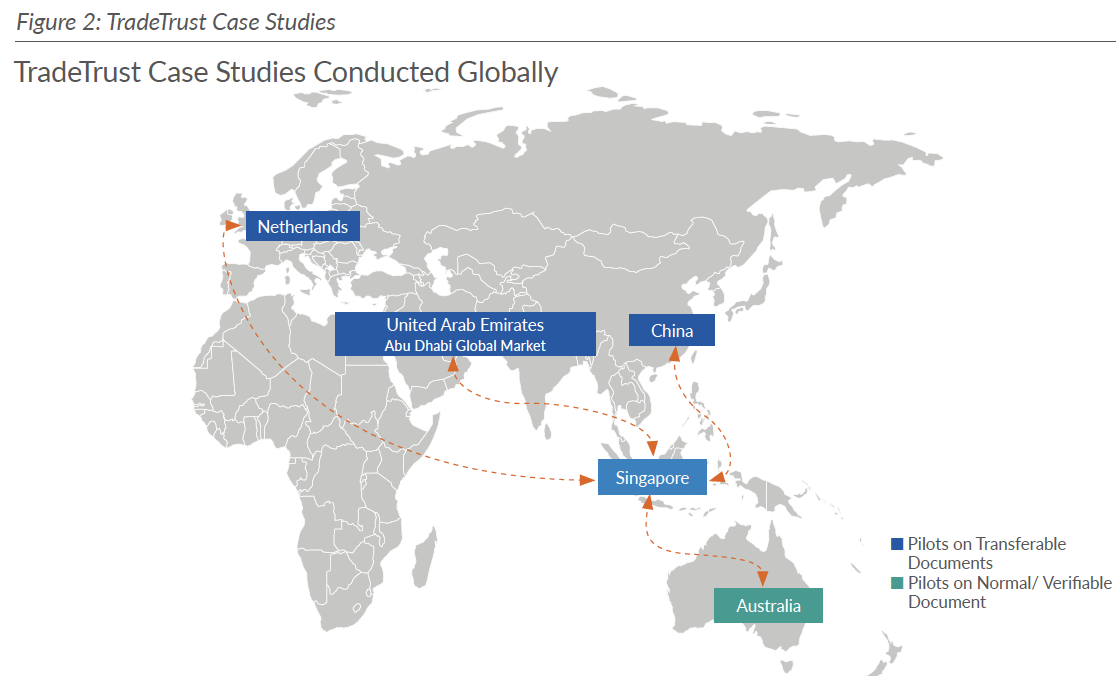A. General Information
1. Title
Trade Financing Pilots to Promote Digital Trade between Singapore and China under Singapore – China (Shenzhen) Smart City Initiative(SCI)
2. Status of the project
Pilot
3. Implementation period of the project/service:
5. Geographical coverage
Bilateral
Participating countries: China, Singapore
6. Participating agencies/entities of the project/service:
a. Development stage
Lead agencies/entities
Singapore Customs & China GACC
Other participating agencies/entities
--
b. Operational stage
Lead agencies/entities (op)
--
Other participating agencies/entities (op)
--
7. Main stakeholders/beneficiaries of the project
Traders (big enterprises)
Transport
Customs
Other Government Agencies (OGAs)
8. Business process category of the project
Forwarding and cargo handling
Transport
Regulatory/official control
Payment
B. Lessons Learned
9. Summary description of the project/service
Brief Summary
Singapore’s Infocomm Media Development Authority spearheaded the development of Trade-Trust, an interoperability framework which comprises a set of globally accepted standards enabling governments and businesses to utilize public blockchains to verify the source and authenticity of documents issued.


a. Objective(s)
Enabled by IMDA’s TradeTrust framework, banks, shipping lines, buyers, sellers, platform service providers and fintech companies have collaborated on successful technical pilots on trade financing using simulated electronic Bills of Lading (eBLs). UOB, together with its Shenzhen Branch in China, and their clients have successfully concluded two digital trade financing technical pilots. DBS Singapore, DBS China and their client have also conducted a third successful technical pilot. The successful pilots conducted in the second half of 2021 demonstrated how key maritime trade documents like the eBL could be used across different trade financing platforms and jurisdictions. Businesses between Singapore and Shenzhen can also soon enjoy expeditious cross-border trade financing transactions as the SCI continues to deepen technological cooperation and test policy innovations between both cities.
b. Business need for the project (background)
Transferable documents: Trade documents that entitle the holder to claim the performance of an obligation or ownership (e.g. bills of lading, bills of exchange, etc.). In 2017, The UNCITRAL Model Law on Electronic Transferable Records (MLETR)117 was introduced to enable legal use of electronic transferable records (ETRs) that are functionally equivalent to transferable documents. The ETRs would need to satisfy the requirements of singularity, exclusive control and integrity. Blockchain technology can be used in the implementation of ETRs. For example, the ERC721 provides a smart contract API used for non-fungible tokens (NFTs) that supports transfers of ownership whilst being able to provide satisfaction of key functional requirements of the MLETR.
c. Business process covered*
--
d. Overall architecture and functionalities*
--
e. Relevant document/figure
10. Documents and data exchanged via the project
(bills of lading, bills of exchange, etc.)
11. Data models/databases, proprietary solutions, hybrid approaches
--
12. Main challenges faced during the project
--
13. Lessons learned from the project
--
14. Main benefit(s) of the project
Enhanced regulatory compliance*
Transaction Cost savings*
Transaction Time savings
Simplified process
14A. Elaborations/detailed description on benefits gained
--
15. Technical/financial/capacity building/other assistance
--
16. Future plan for expansion of the project
--
17. Other information or relevant references on the project
--
18. Relevant document regarding the project
C. Relevant Standards
19. Name(s) of any international, national legal instrument underpinning the project
--
20. Electronic message standard
20A. Electronic message standard supporting the project
20B. Type of standard for electronic message applied for the project
21. Technical communication standard
21A. Technical communication standard supporting the project
--
21B. Type of technical communication standard applied for the project
22. Security-related standards*
22A. Security-related standard supporting the project
--
22B. Type of security-related standard applied for the project
23. Other Technical Information
23A. Interface developed for data exchange with an internal system
--
23B. Other technical implementation information
--


